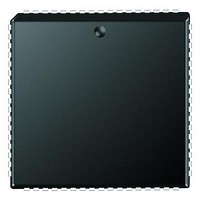PIC18F6680-I/L Microchip Technology, PIC18F6680-I/L Datasheet - Page 26

PIC18F6680-I/L
Manufacturer Part Number
PIC18F6680-I/L
Description
Microcontrollers (MCU) 64KB 3328 RAM 52 I/O
Manufacturer
Microchip Technology
Datasheet
1.PCM18XK1.pdf
(496 pages)
Specifications of PIC18F6680-I/L
Processor Series
PIC18F
Core
PIC
Data Bus Width
8 bit
Data Ram Size
3.25 KB
Interface Type
I2C/SPI/AUSART/CAN
Maximum Clock Frequency
40 MHz
Number Of Programmable I/os
53
Number Of Timers
5
Operating Supply Voltage
4.2 V to 5.5 V
Maximum Operating Temperature
+ 85 C
Mounting Style
SMD/SMT
3rd Party Development Tools
52715-96, 52716-328, 52717-734, 52712-325, EWPIC18
Development Tools By Supplier
PG164130, DV164035, DV244005, DV164005, PG164120, ICE2000, ICE4000, DV164136
Minimum Operating Temperature
- 40 C
On-chip Adc
12-ch x 10-bit
Program Memory Type
Flash
Program Memory Size
64 KB
Package / Case
PLCC-68
Lead Free Status / RoHS Status
Lead free / RoHS Compliant
Available stocks
Company
Part Number
Manufacturer
Quantity
Price
Company:
Part Number:
PIC18F6680-I/L
Manufacturer:
RUBYCON
Quantity:
46 000
Part Number:
PIC18F6680-I/L
Manufacturer:
MICROCH
Quantity:
20 000
- Current page: 26 of 496
- Download datasheet (9Mb)
PIC18F6585/8585/6680/8680
TABLE 2-2:
DS30491C-page 24
These values are for design guidance only.
See notes following this table.
20.0 MHz
32.0 kHz
200 kHz
1.0 MHz
4.0 MHz
8.0 MHz
Note 1: Higher capacitance increases the stability
Mode
HS
LP
XT
2: Rs (see Figure 2-1) may be required in
3: Since each resonator/crystal has its own
of the oscillator, but also increases the
start-up time.
HS mode, as well as XT mode, to avoid
overdriving crystals with low drive level
specifications.
characteristics, the user should consult the
resonator/crystal manufacturer for appro-
priate values of external components, or
verify oscillator performance.
20.0 MHz
25.0 MHz
Epson CA-301 20.000M-C ± 30 PPM
32.0 kHz
Epson C-001R32.768K-A
200 kHz
200 kHz
1.0 MHz
4.0 MHz
4.0 MHz
8.0 MHz
Epson CA-301 8.000M-C
STD XTL 200.000KHz
Freq
CAPACITOR SELECTION FOR
CRYSTAL OSCILLATOR
ECS ECS-10-13-1
ECS ECS-40-20-1
Ranges Tested:
Crystals Used
47-68 pF
15-33 pF
15-33 pF
33 pF
15 pF
15 pF
15 pF
15 pF
TBD
C1
± 20 PPM
± 20 PPM
± 50 PPM
± 50 PPM
± 30 PPM
47-68 pF
15-33 pF
15-33 pF
33 pF
15 pF
15 pF
15 pF
15 pF
TBD
C2
An external clock source may also be connected to the
OSC1 pin in the HS, XT and LP modes, as shown in
Figure 2-2.
FIGURE 2-2:
2.3
For timing insensitive applications, the “RC” and
“RCIO” device options offer additional cost savings.
The RC oscillator frequency is a function of the supply
voltage, the resistor (R
ues and the operating temperature. In addition to this,
the oscillator frequency will vary from unit to unit, due
to normal process parameter variation. Furthermore,
the difference in lead frame capacitance between pack-
age types will also affect the oscillation frequency,
especially for low C
take into account variation due to tolerance of external
R and C components used. Figure 2-3 shows how the
R/C combination is connected.
In the RC Oscillator mode, the oscillator frequency
divided by 4 is available on the OSC2 pin. This signal
may be used for test purposes or to synchronize other
logic.
FIGURE 2-3:
The RCIO Oscillator mode functions like the RC mode
except that the OSC2 pin becomes an additional gen-
eral purpose I/O pin. The I/O pin becomes bit 6 of
PORTA (RA6).
C
V
Recommended values:
R
Clock from
Ext. System
EXT
SS
EXT
V
DD
RC Oscillator
Open
F
OSC
EXT
/4
EXTERNAL CLOCK INPUT
OPERATION (HS, XT OR
LP OSC CONFIGURATION)
RC OSCILLATOR MODE
OSC1
OSC2/CLKO
EXT
values. The user also needs to
2004 Microchip Technology Inc.
3 k
C
EXT
) and capacitor (C
OSC1
OSC2
> 20pF
PIC18FXX80/XX85
R
PIC18FXX80/XX85
EXT
100 k
Internal
Clock
EXT
) val-
Related parts for PIC18F6680-I/L
Image
Part Number
Description
Manufacturer
Datasheet
Request
R

Part Number:
Description:
20-Pin USB Flash Microcontrollers
Manufacturer:
MICROCHIP [Microchip Technology]
Datasheet:

Part Number:
Description:
PIC18F With 128-segment LCD Driver And 12-bit ADC, 8KB Flash, 768B RAM, CCP, MSS
Manufacturer:
Microchip Technology
Datasheet:

Part Number:
Description:
PIC18F With 128-segment LCD Driver And 12-bit ADC, 16KB Flash, 768B RAM, CCP, MS
Manufacturer:
Microchip Technology
Datasheet:

Part Number:
Description:
PIC18F With 192-segment LCD Driver And 12-bit ADC, 8KB Flash, 768B RAM, CCP, MSS
Manufacturer:
Microchip Technology
Datasheet:

Part Number:
Description:
PIC18F With 192-segment LCD Driver And 12-bit ADC, 16KB Flash, 768B RAM, CCP, MS
Manufacturer:
Microchip Technology
Datasheet:

Part Number:
Description:
Microcontrollers (MCU) 48KB 3328 RAM 52 I/O
Manufacturer:
Microchip Technology
Datasheet:

Part Number:
Description:
32kB Flash, 2kB RAM, 1kB EE, NanoWatt XLP, LCD 64 QFN 9x9x0.9mm T/R
Manufacturer:
Microchip Technology
Datasheet:

Part Number:
Description:
32kB Flash, 2kB RAM, 1kB EE, NanoWatt XLP, LCD 64 TQFP 10x10x1mm T/R
Manufacturer:
Microchip Technology
Datasheet:

Part Number:
Description:
128kB Flash, 4kB RAM, 1kB EE, 16MIPS, NanoWatt XLP, LCD, 5V 80 TQFP 12x12x1mm T/
Manufacturer:
Microchip Technology
Datasheet:

Part Number:
Description:
32kB Flash, 2kB RAM, 1kB EE, NanoWatt XLP, LCD 64 QFN 9x9x0.9mm TUBE
Manufacturer:
Microchip Technology
Datasheet:

Part Number:
Description:
32kB Flash, 2kB RAM, 1kB EE, NanoWatt XLP, LCD 64 TQFP 10x10x1mm TRAY
Manufacturer:
Microchip Technology

Part Number:
Description:
128kB Flash, 4kB RAM, 1kB EE, 16MIPS, NanoWatt XLP, LCD, 5V 80 TQFP 12x12x1mm TR
Manufacturer:
Microchip Technology

Part Number:
Description:
Manufacturer:
Microchip Technology Inc.
Datasheet:











